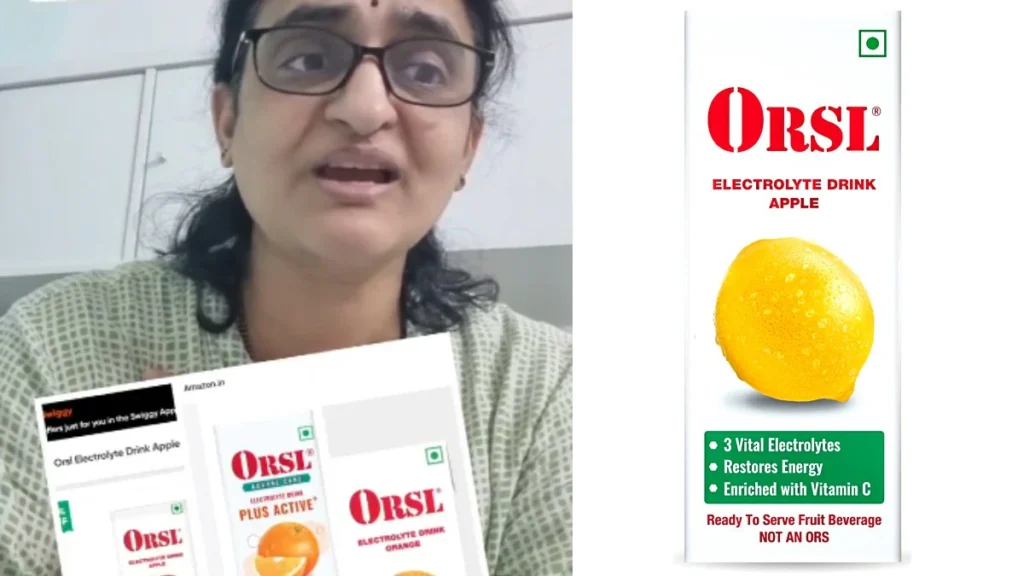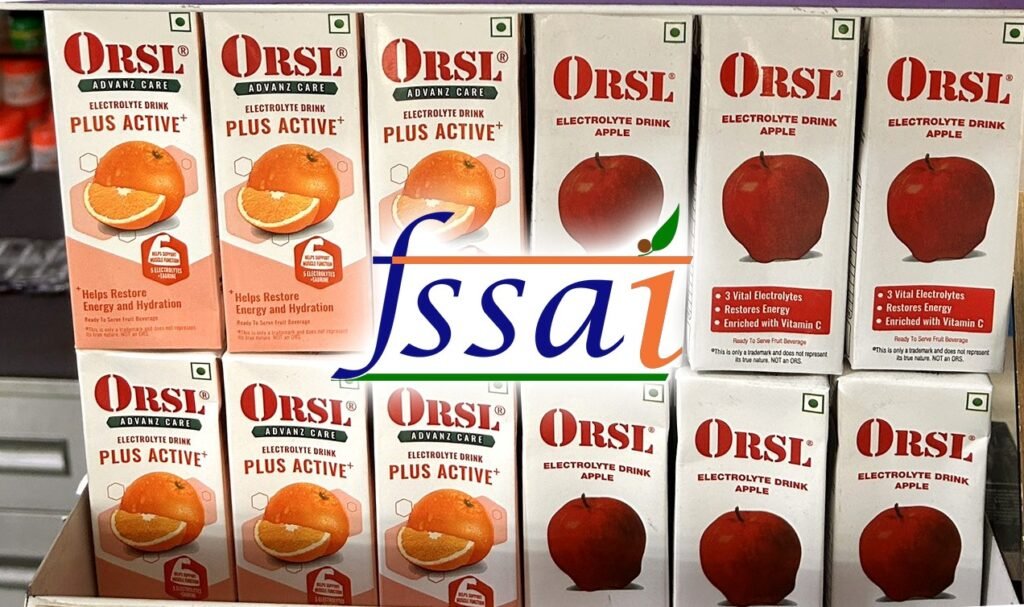The Food Safety and Standards Authority of India (FSSAI) has firmly denied allegations that it permitted the sale or disposal of ORSL, a high-sugar beverage marketed as an oral rehydration solution (ORS), amid growing online outrage and misinformation. The clarification came after Hyderabad-based paediatrician Dr Sivaranjani Santosh accused the regulator of consenting to a stay order allowing Johnson & Johnson’s spin-off company, Kenvue, to clear its product stocks through its Indian subsidiary, JNTL.
This issue arose in the wake of FSSAI’s recent public advisory banning the use of “ORS” on product labels unless they adhere strictly to the World Health Organisation (WHO) standards, a directive that targeted misleading branding of sugary drinks as medical-grade hydration solutions.
The Origin of the Dispute
The controversy began when Dr Sivaranjani shared a video and social media posts on October 23, 2025, accusing FSSAI of “consenting” to a stay order that allowed JNTL to dispose of its existing stocks of high-sugar ORSL. “It’s a national shame,” she wrote, tagging the Prime Minister’s Office and the Ministry of Health. In her video, she questioned how India could permit such an action when similar violations abroad would trigger massive legal scrutiny.
Her criticism gained widespread online traction, with fellow medical professionals and consumer advocates amplifying her concerns. They argued that continued sale or stock clearance of these misleading drinks endangered child health, especially in a country where diarrhoeal deaths remain a pressing concern.
FSSAI’s Clarification: “No Permission Granted”
In immediate response, FSSAI issued a categorical denial on social media, calling the circulating claims a “misrepresentation of facts.” The regulator stated unequivocally that it had “not permitted or consented to the sale or disposal of ORSL.” It urged the public and media to rely on official court documents rather than social media interpretations.
The agency’s statement sought to curb misinformation spreading online, clarifying that it continues to enforce its October 14 advisory, which prohibits the misuse of the “ORS” label on non-medical beverages.
A Broader Fight Against Misleading ORS Drinks
The controversy was triggered amid a landmark crackdown by FSSAI earlier this month. Following years of paediatrician-led advocacy, especially by Dr Sivaranjani, the health regulator banned food and beverage companies from using the term “ORS” in names or trademarks, including derivatives such as “Smart ORS” or “Hydra ORS.”
The decision was rooted in findings that several so-called rehydration beverages, including ORSL, contained dangerously disproportionate sugar levels. While a medically approved ORS contains about 13.5 grams of dextrose and carefully balanced electrolytes per litre, many commercial “ORS” drinks contain more than 120 grams of sugar, effectively turning them into soft drinks.
Such products pose significant health risks, especially to children suffering from dehydration. Elevated sugar levels can worsen fluid loss rather than replenish it, undermining the lifesaving purpose of oral rehydration therapy.
The Role of JNTL and the Stay Order Controversy
JNTL Consumer Health, the Indian subsidiary of Kenvue (the Johnson & Johnson spin-off), petitioned the Delhi High Court after FSSAI’s October 14 directive restricted its ability to market ORSL under the “ORS” branding. The court granted an interim stay, temporarily pausing parts of FSSAI’s order and allowing the company to represent its case before the regulator.
Dr Sivaranjani interpreted this court stay as being “consented” to by FSSAI, leading to her viral allegations. However, the regulator clarified that it had no role in consenting to or facilitating the stay order and continues to pursue compliance under legal supervision.
Health experts, however, warn that any delay in implementing the ban risks undermining public trust and could endanger the health of millions of children for whom genuine ORS remains a critical medical intervention.

The Medical Facts: What True ORS Should Contain
According to WHO standards, a proper ORS must include:
- 2.6 grams of sodium chloride
- 1.5 grams of potassium chloride
- 2.9 grams of sodium citrate
- 13.5 grams of dextrose per litre of clean water
This exact formula replenishes both electrolytes and fluids and has been proven to reduce diarrhoeal mortality by more than 90%. Any deviation, especially those with excessive sugar or insufficient salt, makes such formulations ineffective and potentially harmful.
In contrast, commercial ORS-branded beverages often exceed sugar limits by tenfold and lack essential electrolytes. This imbalance can worsen dehydration symptoms and raise blood sugar levels dangerously, particularly in children.
Child Health Crisis and Market Accountability
India faces one of the world’s highest child mortality rates linked to diarrhoea, with 13 of every 100 child deaths attributed to the condition. The improper marketing of sugary drinks as rehydration therapies deepens this crisis, exploiting parental trust through deceptive branding and celebrity endorsements.
Consumer protection advocates argue that public education campaigns should accompany policy enforcement, ensuring people recognise genuine ORS packets and distinguish them from commercial beverages masquerading as medical aids.
Public and Professional Reactions
The medical community has largely supported FSSAI’s October 14 directive, but remains wary of judicial delays and regulatory ambiguity. Dr Alok Gupta, a Jaipur-based paediatrician, echoed the sentiments on social media, stating that authorities must restore WHO-ORS in the market immediately and eliminate corporate malpractice that “harms Indian children.”
Consumer groups argue that the issue reflects a deeper pattern in which large corporations use surrogate marketing to sidestep medical labelling regulations. The incident has sparked calls for stricter penalties, mandates for laboratory testing, and transparent public disclosure of the compositions of all rehydration products.
Moving Forward: A Call for Transparency
The FSSAI now faces heightened pressure to swiftly act against misleading health claims in beverage marketing. The regulator’s firm denial of consenting to ORSL’s disposal underscores its commitment to upholding the ban, but the episode also highlights the communication gap between public health authorities and the general public.
For Dr Sivaranjani and others who fought for years to protect consumers, the goal remains clear: ensure that no child receives sugar water in the name of medicine. As India’s food regulator seeks to rebuild confidence following this communication crisis, the nation’s collective focus must remain on enforcing evidence-based health standards rather than corporate influence.
